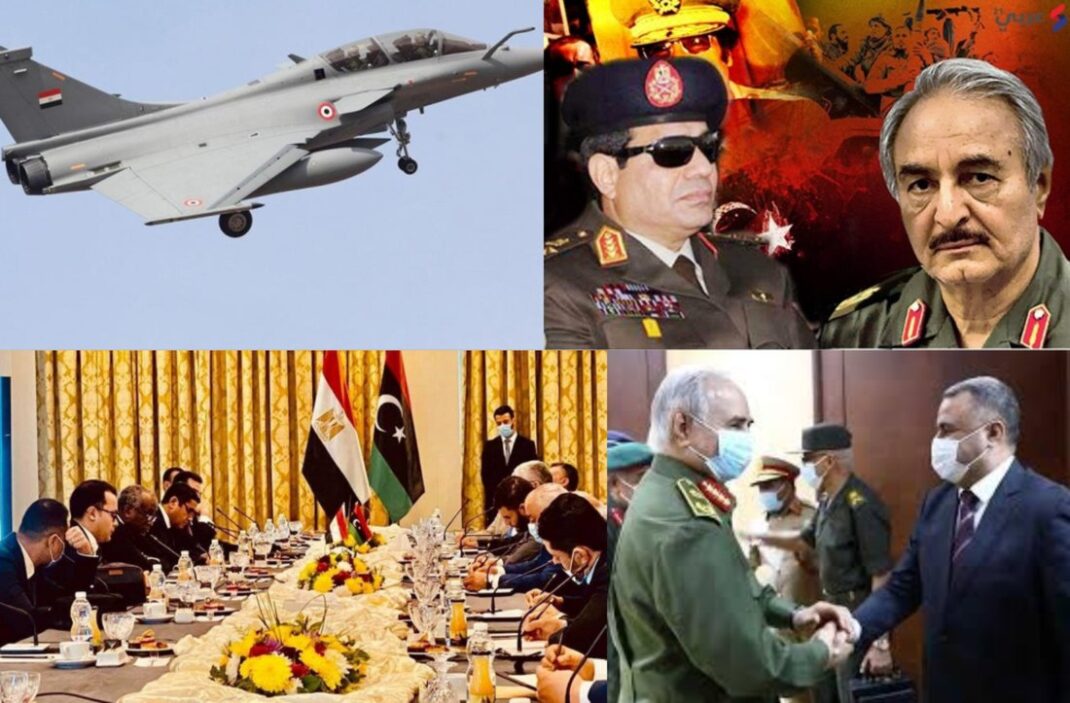 In the first step of its kind since mid-2014, an official Egyptian delegation arrived in the Libyan capital, Tripoli, on Sunday 27 December 2020.
In the first step of its kind since mid-2014, an official Egyptian delegation arrived in the Libyan capital, Tripoli, on Sunday 27 December 2020.
The delegation included Deputy Head of General Intelligence Ayman Badie, Ambassador Muhammad Abu Bakr, in-charge of the Libyan file at the Ministry of Foreign Affairs, and diplomatic and security personnel from the ministries of foreign affairs, interior and defense.
The Egyptian delegation’s talks with officials in the Government of National Accord focused, according to available reports, on activating joint economic agreements, resuming flights between the two capitals, and reopening the Egyptian embassy in Tripoli.
The resumption of communications between the two parties after nearly six years of estrangement prompts a number of questions on the motives of the visit, and its contexts, goals and repercussions on the Libyan political and military scene.
Taking sides
Egyptian-Libyan relations took a sharp turn, beginning in mid-2014, after retired Major General Khalifa Haftar launched “Operation Dignity,” entrenching the split in ruling institutions between eastern and western Libya.
While the National Salvation Government and the General National Congress remained in the capital, Tripoli, the interim Libyan government formed in the city of Bayda, and members of the House of Representatives supporting “Operation Dignity” took up Tobruk as the seat of their assembly.
Since the onset of the divide, Egyptian authorities have not hidden their political and military bias in favour of General Haftar’s camp.
The history of Egyptian intervention in Libya goes back to an early period of the country’s division, when Egyptian warplanes carried out air strikes targeting sites of the “Libya Dawn” forces in the capital, Tripoli, and the western region in August 2014.
Since that time, Egypt has stepped up its military support for Haftar, launching repeated air strikes on the city of Derna, outside the control of Haftar’s forces until mid-2018. Sources close to Haftar spoke of the decisive role of Egyptian warplanes and special forces in battles that raged between Haftar’s forces and the “Benghazi Revolutionaries Shura Council” over more than three years.
The ratification of the Libyan political “Skhirat Agreement” in December 2015 did not lead to a fundamental change in the Egyptian position on the conflict in Libya.
Although the agreement produced an internationally recognized governing institution, represented by the Presidency Council and the Government of National Accord, Egypt continued its political, military and media support for Haftar, without officially rejecting the agreement’s outcomes.
The attack waged over nearly a year by General Haftar’s forces on the capital Tripoli and the western region led to an escalation of regional intervention in Libya and the advent of new actors, namely Russia and Turkey.
During the first months of the attack on Tripoli, the regional axis of the United Arab Emirates and Egypt represented the most prominent and important components of Haftar’s media, political and military support.
Russia joined the pro-Haftar’s camp through the ubiquitous presence of “Wagner” mercenaries in the southern battle theatres of Tripoli, the city of Sirte, and the al-Jufra district, leading to a tightening of the noose on National Accord Government forces inside the capital.
However, the military arena witnessed a major turnaround after the National Accord Government signed a military agreement with Turkey on 27 November 2019, demarcating maritime borders.
It is through this agreement that Turkish military support was provided to the Accord Government, enabling it to regain from Haftar’s forces all cities in the western region, thereby diminishing chances of a military victory, and encouraging the two sides to opt for a ceasefire.
Motives for the Shift in the Egyptian position
The recent visit of the Egyptian delegation to Libya should be seen within this context; it expresses an Egyptian inclination to acquiesce in the absence of a military option deciding the conflict in favour of Haftar and the regional-international axis supporting him.
It seems clear that Cairo is not entertaining a direct military clash with National Accord Government forces backed by Turkey or any slippage into complete immersion in the Libyan conflict, notwithstanding the warnings Egyptian President Abdel Fattah El-Sisi gave to Turkey of the consequences of a continued advance of National Accord forces towards the east, after they had expelled Haftar’s forces from all regions of western Libya.
The launch of the political settlement process in Libya, the “Libyan Political Dialogue Forum” sponsored by the UN mission, represents another factor pressuring Cairo to adjust its policy and keep in line with developments in the Libyan file following Haftar’s forced retreat from Tripoli and the western region, and his diminishing military options.
Despite faltering seen in dialogue sessions, thus far several indicators serve to affirm continued broad regional and international support for this trajectory, with the United Nations mission on the way during 2021 to achieving agreement on unifying the executive authority and sovereign institutions and to organizing general elections.
The involvement of components from the political camp affiliated with Haftar in the political dialogue, whether through the 75th meeting sponsored by the United Nations mission or through joint discussions held by members of Parliament in Tangiers and Ghadames, provides new incentives for Cairo to open channels of communication with all parties and abstain from betting on one side or the other.
The Egyptian delegation of intelligence, security and military personalities visiting Tripoli indicates that security still looms large in official Egyptian dealings on the Libyan stage.
Yet, matters deliberated with Government of National Accord officials went beyond immediate security concerns; discussions extended to the activation of previously signed economic agreements, establishing air links, and reopening Egyptian consular and diplomatic services in Tripoli.
The Egyptian bias towards Haftar’s camp, in parallel with security breakdown and the political and institutional division in Libya, has brought severe damage to Egyptian economic interests in Libya, with Egyptian migrant worker employment declining by half.
The value of remittances pumping into an exhausted Egyptian economy decreased, and Egyptian exports to the Libyan market diminished to nearly a quarter;
70 percent of the Libyan population is concentrated in the central and western regions which are mostly subject to the authority of the Government of National Accord.
The Regional Context
Although figuring prominently among motives for recent Egyptian overtures towards Libya, the on-going transformations in the Libyan arena after retired Major General Haftar and his supporters failed in their attack on Tripoli hardly comprise the only factor explaining developments in Egyptian policy towards the country.
Turkey’s entrance on the stage of political and military conflict in support the Government of National Accord represented a major challenge to the regional axis with Egypt at its core; for this axis, the battle turned from a confrontation solely, in the initial months, with the forces of the Government of National Accord, to confrontation with these last – and their Turkish – supporters.
The impact of the challenge appeared clearly in the field, with military reversals leading within a few weeks to the declaration of a ceasefire and the launch of tracks of dialogue between the Libyan factions.
The Egyptian-Turkish dispute is not solely related to either country’s position on the parties to the Libyan conflict. The signing of the maritime agreement between Turkey and Libya had escalated existing geopolitical differences between Turkey on the one hand and Greece, Egypt and Israel on the other.
This was evidenced by Egyptian political and media discourse, continually characterizing the Turkish presence in Libya as a project of Turkish hegemony and a threat to Egyptian national security.
Despite deep differences between the two parties over the Libyan dossier and respective influence in the eastern Mediterranean, the arrival of a new American administration to power in Washington that is less sympathetic to Turkish and Egyptian policies in the region may give rise to some warmth in Egyptian-Turkish relations.
Recently Turkish positions have included implicit calls for dialogue, calm, and deconfliction, and Ankara has succeeded in opening communication channels with political actors in eastern Libya, receiving an envoy from Tobruk Parliament Speaker Aquila Saleh in what appears to be a Turkish attempt to exploit the contradictions between Saleh and Haftar, whom Ankara holds responsible for the continued conflict in Libya.
It is not unlikely that Egypt is also trying to take advantage of differences and contradictions within the Tripoli camp, especially after some officials felt that the UN-led dialogues had marginalized them.
The regional contexts of changes in Egyptian policy towards Libya extend beyond the Turkish entrance onto on the Libyan stage and the struggle for influence in the eastern Mediterranean; it has been noted that the Russian military intervention on Haftar’s side came at the expense of the Egyptian role as evidence by Turkish-Russian bilateral understandings on Libya to which Cairo was not party.
In addition, Egypt is increasingly concerned with the continued Ethiopian establishment of water projects, especially the construction and filling of the Renaissance Dam, paying no heed to Egypt’s struggle to engage in more than one regional conflict at once.
In this context, the new Egyptian move towards Libya raises questions about whether this might represent the beginning of differentiation from an Emirati approach still betting on the option of a military settlement in Haftar’s favor, while Cairo seems to be inclined towards calm in Libya and with Turkey so as to focus more on water security issues and the escalating tension in its relationship with Ethiopia – whose prime minister the UAE seems to treat as an ally, without so much as a sidelong glance at Egypt.
On another level, Egypt faces marginalization of a sort on two issues that it considers essential in terms of its regional presence. In recent times, the pace of normalization between several Arab countries and Israel has accelerated, and the blockade imposed on Qatar since June 2017 has begun to crumble.
Egypt is facing Saudi pressure to agree to lift the blockade and reconcile with Qatar, against a countervailing Emirati pressure to toughen against Qatar – and all this only days before the new US administration takes up its duties amid expectations of impending adjustments in the handling of the region’s files.
Cairo fears that more Arab countries normalizing relationships with Israel will lead to a decline in its role in the Middle East and in any settlement that the administration of President-elect Joseph Biden may promote on the Palestinian issue – or in the Horn of Africa, which is witnessing Israeli-Emirati cooperation by-passing consultation with Egypt.
As for the Gulf crisis, it seems that the movement towards settling this matter is taking place distant from Egypt’s calculations, calculations which had been instrumental in imposing the blockade on Doha.
Policies of ill-conceived and biased intervention in the region’s conflicts, including the Libyan conflict, have inflicted severe damage on Egyptian security and economic interests. Egypt may well be in the process of reconsidering them.
Conclusion
The visit by an Egyptian security and political delegation to Tripoli constitutes an important development in Egypt’s official handling of the Libyan file since its political, military and media bias in favour of Major General Khalifa Haftar.
Although Egyptian official discourse was keen to place the visit within a framework of Egyptian diplomatic tradition and an effort to bridge the divide between the Libyan factions, the developments in the Libyan political and military situation, in addition to regional and international contexts, were the main drivers of this step.
Cairo fears that its isolation from any settlement process launched in Libya will lead to a loss of influence and diminished regional status if it continues to favour one Libyan side against the other, and that it may remain wholly dependent on acquiescence to playing secondary roles in regional projects.
However, this adjustment, despite its importance, still does not ascend to the level of a strategic review of Egyptian policy towards Libya, one that would break with the prevailing approach since Sisi came to power more than six years ago.
_____________





